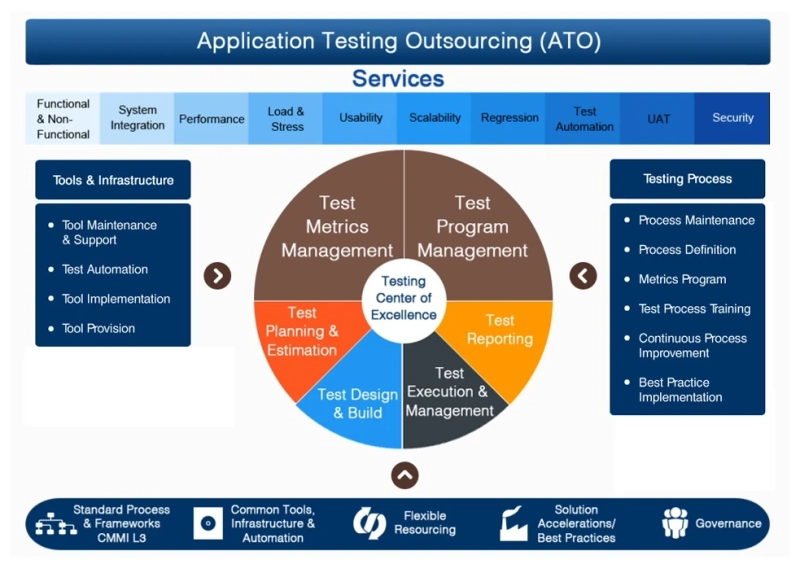Introduction: The Strategic Rise of Mobile Testing Outsourcing
In today’s hyper-connected digital economy, mobile applications have become a primary interface for customer interaction. Whether it is a financial institution managing secure transactions, an eCommerce platform ensuring smooth checkouts, or a startup launching a new social app, flawless mobile performance directly impacts brand reputation and revenue. With increasing device fragmentation, rapid OS updates, and rising user expectations, companies are finding it challenging to maintain consistent quality through in-house testing teams alone. This is where mobile testing outsourcing is becoming a critical strategy. It enables organizations to leverage specialized expertise, diverse testing environments, and advanced automation tools without the cost and complexity of maintaining a large internal QA department. A CEO’s viewpoint often emphasizes how outsourcing helps align quality assurance with business growth strategies, ensuring faster releases without sacrificing user satisfaction. India, recognized globally for its IT talent and cost-effectiveness, has emerged as a leading hub for outsourced mobile testing. Compared to the United States, where operational costs are significantly higher, India offers the same—if not better—quality at a fraction of the price. This advantage is magnified by round-the-clock testing cycles enabled by time zone differences. According to a Gartner forecast, the mobile app market is expected to exceed $614 billion by 2026, making reliable and efficient testing more critical than ever. This blog explores why businesses are embracing outsourcing, how it compares across geographies, and why companies like V2Soft are redefining industry standards through innovation and AI-powered testing models.
Why Application Testing Outsourcing Delivers Consistent Results
Quality assurance is not merely about detecting bugs—it is about ensuring that the application meets user expectations consistently, regardless of device, location, or usage patterns. Companies are increasingly turning to application testing outsourcing to address the growing complexity of multi-platform releases. Unlike in-house teams, outsourced QA providers bring broader device libraries, deep domain knowledge, and access to automation frameworks that accelerate testing without compromising accuracy. By outsourcing, businesses can:
- Reduce dependency on limited internal resources.
- Access a global talent pool with niche testing expertise.
- Scale testing capacity up or down based on project needs.
In markets like the US, where skilled QA professionals are in high demand and command premium salaries, outsourcing allows companies to maintain high-quality standards while managing budgets effectively. India’s vast network of skilled testers, combined with competitive rates, enables continuous 24/7 testing cycles, resulting in faster identification and resolution of defects. The benefits extend beyond cost savings; outsourced teams often have cross-industry experience, enabling them to anticipate and address performance challenges more effectively. Case studies show that application testing outsourcing reduces release delays by up to 30% and improves overall defect detection rates by over 40%. By integrating these capabilities early in the development lifecycle, businesses ensure their apps deliver smooth, consistent user experiences in even the most demanding market conditions.
Maximizing Speed with Software Application Testing Outsourcing
In the fast-paced digital economy, time-to-market can determine whether an app succeeds or fails. Software Application Testing Outsourcing has emerged as a powerful enabler for speed without sacrificing quality. Through parallel testing processes, automation integration, and dedicated resource allocation, outsourced QA providers significantly shorten development cycles. Companies adopting this approach often report:
- Release cycles up to 35% faster compared to in-house-only models.
- Early defect detection, reducing post-launch issues by over 25%.
- Enhanced scalability during peak release periods.
A critical advantage lies in the ability to run tests continuously across multiple environments without exhausting internal teams. This is particularly important for industries like banking, healthcare, and retail, where downtime or poor performance can result in significant financial losses and brand damage. The global outsourcing market for QA is projected to grow at a CAGR of 8.5% through 2028, with Asia-Pacific leading adoption rates due to its talent availability and cost structure. V2Soft is at the forefront of this shift, using AI-driven testing solutions to identify defects earlier in the lifecycle. These solutions incorporate predictive analytics, automated regression testing, and real-device cloud platforms to ensure compatibility across thousands of device and OS combinations. This approach not only accelerates delivery but also enhances accuracy, enabling companies to launch with greater confidence. Speed in testing directly translates into faster market entry, better competitiveness, and improved customer satisfaction—making outsourcing a strategic necessity rather than just an operational choice.
How an Outsourced Software Testing Company Improves Quality
Partnering with an Outsourced Software Testing Company offers far more than simple bug hunting—it builds a long-term quality assurance framework that aligns with the company’s digital roadmap. These partners typically provide expertise in functional testing, performance benchmarking, security audits, usability assessments, and compliance validation. Benefits of engaging such companies include:
- Access to specialized testing tools and licensed platforms without extra investment.
- Structured documentation and transparent reporting for better decision-making.
- Flexibility to scale testing operations based on evolving project needs.
US-based businesses often choose offshore partners in India because of their advanced testing infrastructure, ISO-certified processes, and ability to deliver at a fraction of the domestic cost. This approach is particularly effective for projects with fluctuating workloads, such as seasonal eCommerce applications or event-driven platforms. Combining manual testing with AI-powered automation ensures a balanced strategy—manual testing captures complex usability nuances, while automation handles repetitive and regression tasks efficiently. Companies that adopt such hybrid strategies report fewer critical defects post-launch and higher user satisfaction scores. Ultimately, outsourcing quality assurance allows internal teams to focus on core product development while relying on experienced QA specialists to safeguard the final user experience. This division of responsibility ensures that apps meet both functional and emotional user expectations, strengthening brand loyalty and long-term engagement.
Mobile Testing Outsourcing as a Competitive Advantage
The mobile app marketplace is fiercely competitive, with thousands of new apps launching daily. In this environment, mobile testing outsourcing becomes a strategic advantage for companies seeking to stand out. Key benefits include:
- Extensive device coverage, ensuring compatibility across multiple brands, models, and OS versions.
- Geographical diversity in testing, simulating real-world network conditions.
- Rapid adaptation to emerging OS updates and security patches.
According to Statista, nearly 25% of users uninstall apps within 24 hours due to poor performance or usability issues. This statistic underscores the necessity for rigorous pre-launch and post-launch testing. Indian providers, such as V2Soft, combine experienced human testers with AI-powered tools to deliver user-centric results. These hybrid testing models detect issues earlier and ensure smooth app performance under varying conditions. Compared to the US, where operational costs for large-scale device testing can be prohibitive, India offers an economical yet equally effective alternative. This cost advantage allows companies to reinvest savings into feature development, marketing, or user acquisition efforts. In markets where customer expectations are rising rapidly, outsourcing mobile testing ensures that businesses not only keep pace but also gain an edge over competitors through reliability and performance excellence.
Expanding IT Efficiency with Outsource Application Support
Testing is only part of maintaining high-quality digital experiences—ongoing operational support ensures that applications continue to perform optimally after launch. Partnering with experts in outsource application support enables continuous monitoring, timely issue resolution, and regular updates. This approach helps businesses:
- Maintain uptime and reliability through proactive maintenance.
- Respond quickly to evolving user requirements or security threats.
- Reduce internal IT workload, freeing resources for innovation.
US enterprises often adopt a hybrid approach—retaining local oversight for compliance-sensitive areas while executing operational tasks offshore in India. This arrangement combines the benefits of proximity with the cost savings of outsourcing. V2Soft’s integrated testing and application support services exemplify how companies can streamline QA and operational workflows under a single vendor, reducing communication delays and improving accountability. Continuous support not only addresses bugs but also manages performance tuning, scalability adjustments, and user feedback integration. This long-term engagement model ensures that apps remain relevant, secure, and aligned with business objectives over time. By viewing support as an extension of quality assurance rather than a separate function, companies can maximize the lifetime value of their applications and sustain customer loyalty.
Conclusion: Future of Mobile Testing Outsourcing
Mobile testing outsourcing has evolved from being a purely cost-driven decision to becoming a strategic enabler for innovation, speed, and quality. The combination of global expertise, advanced testing infrastructure, and AI-powered solutions allows companies to deliver flawless mobile experiences faster and more affordably. India’s leadership in affordability, scalability, and technical talent positions it as the preferred choice for many global enterprises, while US providers continue to excel in compliance-heavy and time-critical projects. The future will likely see more hybrid outsourcing models—balancing local oversight with offshore execution—to achieve the best of both worlds. Companies like V2Soft are already setting benchmarks with AI-driven QA processes and integrated support services, ensuring that clients can compete effectively in an increasingly app-centric world. For businesses seeking to differentiate through quality, mobile testing outsourcing is no longer optional—it is essential.
Have Questions? Ask Us Directly!
Want to explore more and transform your business?
Send your queries to:
vtusoftbglr@gmail.com / info@v2soft.com


